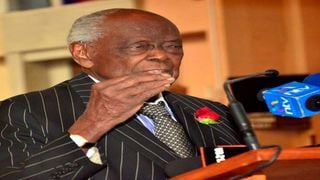
Former Attorney General the late Charles Njonjo.
| FileNews
Premium
Controversies that marred Charles Njonjo’s life
Though deemed as a perfect gentleman, the late Sir Charles Njonjo private and public life was full of controversies. Here are a few;
1. In 2013, while attending former Kiambaa MP’s Stanley Githunguri’s bid to be Kiambu’s first senator at Kirigiti Stadium, Njonjo, who was the chief guest, addressed the former MP’s supporters in Kiswahili much to the chagrin of the locals who preferred to be addressed in Kikuyu.
Despite their protests, he stuck to Kiswahili and worsened it by asking them whether a Kikuyu must be elected as president. His utterances attracted jeers from the crowd as they made it appear like he was supporting former Prime Minister Raila Odinga at a time when all other leaders, including Githunguri, were rallying behind President Uhuru Kenyatta and Deputy President William Ruto, who were facing charges at the International Criminal Court in The Hague, Netherlands.
2. Njonjo was known for drinking beer only from his own silver mug. In one incident recorded in Karume’s autobiography, Beyond Expectations, from Charcoal to Gold, he left the mug behind after attending a party at Njenga Karume’s palatial home in Cianda and ordered the entire provincial administration to search for it and return it to him. The mug was found in Karume’s kitchen where a domestic worker had cleaned and arranged it in the cabinet.
3. Just like his close friend and former powerful Minister in Moi's government, Jeremiah Kiereini, who died aged 90 and with whom he served as co-directors at CFC bank, Njonjo was cremated shortly after his death.
4. Njonjo declared that he did not like greeting Luos to avoid contracting cholera. The disease was prevalent in the lakeside region in the 60s and 70s.
5. Njonjo also refused to prosecute any woman charged with abortion. He believed women had the right to decide if to keep or terminate a pregnancy.
6. During his study in South Africa in 1944, he hopped onto a train from Durban to Fort Hare in Winter and suffered first-hand apartheid by being thrown into an animal carriage as he was not eligible for a ride in the human cabin.
7. In London, still as a student, he worked as a waiter for survival.
8. In 1977, George Anyona tabled papers indicating that Njonjo and others were colluding with the British Commissioner to suspend a Sh200 million contract to purchase spare parts for the Kenya Railways that a Canadian firm had won. Njonjo, then serving as Attorney General, got so mad that he signed Anyona's detention papers. Anyona was released two years later.
9. In 1984, then a Member of Parliament for Kikuyu constituency and Minister for Justice and Constitutional Affairs, he faced an inquiry that was commissioned by President Daniel Moi to look into his conduct based on claims that he plotted a coup.
After 100 days of sittings, the commission found the minister guilty, but before he could be charged with treason, President Moi, in a shocking turn of events, declared that he had pardoned Njonjo due to his “advanced age” and “distinguished” civil service to the country. Seven years ago, in an interview at KTN’S Jeff Koinange Live, the powerful former minister revealed that he resigned from the ministerial position voluntarily and out of his sense of discipline.
“I was blamed for something I had not done and resigned, although it was never disclosed that I resigned. I wrote a letter to the president that in view of what is being alleged in Parliament, I resigned. I walked away and never put my foot in that house again,” he said.
10. Njonjo was appointed by Moi as the chairperson of the Kenya Wildlife Service where he is claimed to have godfathered a small clique of state officials that captured portions of the wildlife sector for its own interests.
11. The former Attorney General married his wife Margaret Bryson at the senior age of 52. His reason for the delay in settling down was that he could not find a girl he could live with. The truth, however, is that he was dating a Kenyan nurse by the name Margaret Wanjiru Koinange but could not decide to marry her despite pressure from his father.
12. It is English mannerisms that earned him the nickname “Duke of Kabeteshire” from those that loathed him and criticised him for harbouring near racist traits with his particular dislike for African lawyers and pilots.
13. Despite being a billionaire and living a good life, Njonjo told Business Daily in 2015 that he said he considered himself poor and not worth anything. Might be the reason he opted for a simple cremation whose costs are not met through a fundraiser.
Some excerpts sourced from Historian Godfrey Sang's book "Just for today; the life and times of Jean-Marie Seroney"





